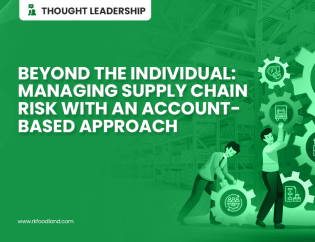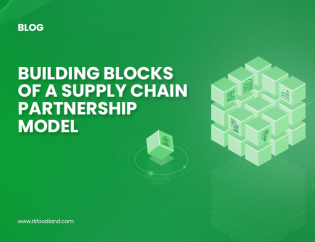
[Avg. Read Time = 4 mins.]
Amidst the daily hustle, a small yet popular bakery in the city confronts a critical challenge beyond the usual dilemmas of production and demand—ingredient quality control. One day, a batch of flour, integral to their famed sourdough, is found to be below standard, compromising the quality of their bread. This incident not only disrupts the day’s operations but also threatens the bakery’s reputation for excellence. Scrambling to address the issue, the bakery team sources a new supply of flour, all while managing customer expectations and salvaging what they can.
This simple story mirrors a complex challenge faced by the food industry at large. Without a predictive supply chain, businesses are left navigating in the dark, relying on guesswork rather than informed decision-making. A predictive supply chain is crucial for sustainable growth, as 79% of companies with high-performing supply chains outpacing their industry’s average revenue growth.
In this blog, we explore three key aspects of achieving predictability in the supply chain: transitioning from reactive to predictive operations for enhanced maturity, the critical role of predictability in supply chain success, and leveraging expert partnerships to navigate the complexities of a predictive supply chain.
Assessing Operational Maturity: From Reactive to Predictive
Understanding the maturity of your supply chain operations is crucial for navigating today’s dynamic business landscape. This journey begins by recognizing the spectrum of operational approaches: reactive, proactive, and predictive. Each reveals your organization’s ability to handle disruptions and seize opportunities.
- Reactive operations represent the most basic level, characterized by responding to issues as they arise. Imagine firefighting – scrambling to solve problems at the last minute, often resorting to short-term fixes with limited effectiveness. While this approach might work in stable environments, it leaves you vulnerable in the face of unexpected events, leading to increased costs, inefficiencies, and customer dissatisfaction.
- Proactive operations represent a significant leap forward. Here, you anticipate challenges and implement strategies to mitigate them before they cause disruption. Think of proactively identifying potential stockouts and securing alternative suppliers. This foresight allows for smoother operations, minimized risks, and improved customer service.
- Predictive operations take the game to the next level. By leveraging data analytics, you can not only foresee issues but also understand their root causes and potential future scenarios. This enables proactive interventions and the development of long-term solutions that address the core problems. 31 percent of supply chain managers use predictive and prescriptive analytics to boost efficiency, predict equipment failures, and schedule preventive maintenance, thus avoiding costly downtime and production delays.
The predictive approach holds immense power. It transforms your supply chain from merely coping with disruptions to anticipating and shaping the future. This ability to forecast demand fluctuations, optimize inventory levels, and proactively manage supplier relationships translates to significant cost savings, improved efficiency, and a competitive edge.
In the next section, we’ll delve deeper into the impact of lacking predictability. We’ll explore how reactive and even proactive approaches can leave you exposed to potential pitfalls, ultimately hindering your business growth and profitability.
Predictability’s Role in Supply Chain Success: Avoiding the Domino Effect
Imagine a single domino teetering precariously. A seemingly minor push triggers its fall, causing it to knock down the next in line, and the next, until the entire chain tumbles. This domino effect perfectly illustrates the interconnectedness of a modern supply chain, where a single inefficiency can wreak havoc across the entire system.
Let’s explore some of the supply chain dominoes that fall due to unpredictability:
- Inefficient Inventory Management: Without accurate demand forecasts, you’re left guessing. Overstocking ties up valuable capital in unsold inventory, impacting cash flow and storage costs. Conversely, understocking leads to stockouts, frustrating customers and potentially losing sales.
- Suboptimal Asset Utilization: Unpredictable lead times and disruptions make it difficult to efficiently schedule production and transportation. This leads to underutilized resources like idle equipment and stranded trucks, impacting overall productivity and driving up per-unit costs.
- Unreliable Supplier Performance: Unforeseen delays or quality issues from suppliers can throw your entire production plan into disarray. Without proactive communication and contingency plans, these disruptions can lead to missed deadlines, production stoppages, and ultimately, frustrated customers.
- Missed Market Opportunities: The inability to anticipate demand fluctuations restricts your ability to react to emerging trends. You might miss out on capitalizing on sudden surges in demand or fail to adjust to shifting customer preferences, ceding valuable market share to more agile competitors.
Beyond these specific areas, unpredictability disrupts the very fabric of your operations. Misalignment and inefficiencies ripple through your business processes, consuming valuable management time and resources that could be redirected towards strategic initiatives. However, embracing integrated supply chain approach can significantly mitigate these challenges by enabling a 25% quicker response to uncertainties, thereby improving predictability. This agility enhances your ability to operate efficiently, meet customer expectations, and achieve your business goals, despite the market’s inherent unpredictability.
In the next section, we’ll move from highlighting the problem to showcasing the solution. We’ll delve into practical strategies and technologies that empower you to gain control and build a truly predictable supply chain.
Navigating Complexities with Expert Partnerships: Unlocking Predictability in Food Supply Chains
As we’ve established, achieving supply chain maturity and operational excellence go hand-in-hand with predictability. The ability to foresee and manage future scenarios becomes increasingly crucial, especially in the complex and dynamic world of food businesses.
Here’s where data analytics plays a pivotal role.
Imagine progressing through a spectrum of data analytics – from descriptive (what happened) to diagnostic (why it happened) and ultimately reaching predictive (what will happen) and prescriptive (what to do) stages. This journey unlocks incredible power. You can move from simply reporting on past performance to forecasting future demand, identifying potential disruptions, and proactively implementing solutions.
However, for food businesses facing unique complexities, advancing to prescriptive analytics often requires specialized expertise and technology capabilities. This is where strategic partnerships come into play.
By partnering with experts, food businesses can gain access to:
- Advanced data-driven strategies: Leverage the expertise of professionals who understand the nuances of the food industry and can tailor analytical solutions to your specific needs.
- Cutting-edge technology: Gain access to industry-specific tools and platforms that can handle the vast amount of data generated by modern food supply chains.
- Enhanced decision-making: Empower your team with actionable insights, enabling them to make data-driven decisions with confidence.
These partnerships go beyond mere technology implementation. They involve a deep dive into your entire supply chain ecosystem, taking a holistic view rather than a narrow lens. By analysing every link in the chain – from sourcing and production to distribution and customer satisfaction – experts can identify hidden inefficiencies and potential disruptions.
The result? A future-proof supply chain empowered by predictability. You can anticipate demand fluctuations, optimize inventory levels, manage supplier relationships proactively, and ultimately, deliver higher-quality assurance to your customers while maximizing efficiency and profitability.
Remember, achieving supply chain maturity is a journey, and expert partnerships can be your invaluable guides on the path to a predictable and successful future.
Discuss with our experts how we can turn predictability into your strategic advantage.
Reference Links
Related Content | Foodland’s Resources
How Supply Chain Visibility and Traceability Can Drive a Sustainable Food Industry
Scaling AI in the supply chain to improve intelligence
Crisis performance predictability in supply chains








